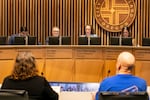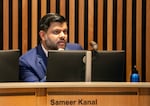
From left, Councilors Sameer Kanal, Dan Ryan, Elana Pirtle-Guiney, and Tiffany Koyama Lane listen to testimony from City of Portland Professional Workers Union members, Feb. 5, 2025, Portland, Ore.
Anna Lueck for OPB
The second-ever meeting of Portland’s new Community and Public Safety committee ended with no action taken and plenty of lingering frustration.
The committee planned to discuss potential changes to the city’s new and upcoming police oversight board. The proposal, from Councilor Sameer Kanal, asked to expand the definition of “bias” that is used to select potential members on the board.
If adopted, Kanal’s proposal also would add a fifth community member to the nominating committee, which helps select and vet the people who will serve on the oversight board. The proposal also would change how the city council picks members of the nominating committee.
The proposal could have led to a robust discussion, but instead a broadcasting issue caused the meeting to end with uncertainty for Kanal’s resolution, which faces criticism from police and local unions.
More than 30 people signed up to give public comments, yet fewer than half actually got time at the microphone.
Committee co-chairs Kanal and Councilor Steve Novick told the audience that they faced a firm 4:45 p.m. deadline, which crunched the amount of time given for people to voice their opinions to roughly a minute-and-a-half. Novick said the issue stemmed from the city’s inability to broadcast that evening.
“We wanted to be able to extend this hearing past five o’clock,” he said. “Today we were simply told we had no choice.”
As Novick noted, the committees are new after Portland City Council was radically restructured after the November election.
“We think that the committees are where public testimony are supposed to take place,” Novick said.
The limited public comment led some observers to vent frustrations, at times talking over councilors, that they were given too little time or none at all. One outburst caused a councilor’s staffer to tell the co-chairs to rein in the crowd.
Councilor Loretta Smith said she was frustrated that Kanal and Novick didn’t factor in time for a large public opinion.
“Putting something on the agenda to make a point when you actually know and expect to have a huge number of people here testifying, it’s disingenuous to say that you didn’t know that this would be this popular,” Smith said.
Councilors did not end up voting on Kanal’s resolution. A spokesperson for Kanal said their office had not decided when to bring up the resolution again.
“I am deeply uncomfortable with the idea that people would be cut off from public testimony,” Kanal said. “I want to encourage everyone who testified here – sorry, everyone who attempted to testify here – to be a part of it the next time it comes up.”
While it’s unclear when that would be, the discussion Tuesday demonstrated how Kanal’s proposal will likely be a political skirmish over who will hold police accountable in the new system.
Definition of “bias”
Portland will soon have a new, citizen-led police oversight board that is empowered to investigate allegations of police misconduct.
The big question ahead is who will get a board spot to wield that power.
Portland forbids current and former law enforcement from serving on the board, as well as any immediate family members. The code also forbids anyone who has a “demonstrated bias for or against law enforcement.”
Kanal contended Tuesday that the current “bias” language is vague and could be applied unevenly.

Councilor Sameer Kanal at a Portland City Council meeting on Feb. 5, 2025, Portland, Ore.
Anna Lueck for OPB
“As it stands, it can potentially result in a situation where a community member can be found ineligible to serve if they’ve ever posted a ‘Blue Lives Matter’ or ‘Black Lives Matter’ on social media,” he said Tuesday.
Kanal made police accountability part of his platform when he stumped for his council seat last year. He was also a former city staffer who helped craft Portland’s new oversight system before the previous city council made tweaks.
Kanal said he worried that the “bias” criteria could be used against people who have experienced systemic racism, dealt with drug abuse or had behavioral health issues in the past.
“People who have dealt with systemic racism, mental illness, addiction or alcoholism are more likely to have interactions with police, statistically, positive or negative,” Kanal said.
He proposed adding code language that defines “bias,” mirroring language that is used to seat jurors in trial.
Councilor Novick then passed an amendment to change the language prohibiting “bias” to instead prohibit any person whose “state of mind” could indicate they are impartial.
Critics at Tuesday’s meeting argued the proposals only added more mud to the appointment process. Councilor Eric Zimmerman said the language “encourages additional bias.”
“I look at the original language and it’s very clear that no bias was what was previously written into code,” Zimmerman said. “This appears to be an attempt, frankly, to introduce bias into the nominating committee or nominating process.”
Aaron Schmautz, who leads Portland police’s rank-and-file union, criticized the language as a means to absolve applicants of past statements that could show they have bias.
The added language “seemed to exist to veil the actual intent,” Schmautz told OPB, “which is, ‘If you’re biased or have a history, we’ll still let you in if you tell us that, in your state of mind, you’re good.’ We can’t measure state of mind.”
With the truncated public comment period, only about a dozen people had time to share their thoughts on the language. Attorney Ashlee Albies said she thought the added language would help.
“There is a difference between holding officers accountable and punishing them,” Albies said. “We are not seeking to punish officers. We are seeking to hold them accountable and that supports public safety for everybody.”
Reopening contracts

Portland Police Bureau, at 1111 Southwest 2nd. Ave., Portland, Ore., July, 2023.
Caden Perry / OPB
Still, police supporters may not be the only ones who will push back on the resolution. Public employee unions are also taking a critical stance.
According to Schmautz, the police union and city leaders struck an agreement last spring that included ratifying several things about the new oversight board, including the “bias” language and nominating process.
When committee members Tuesday asked about re-bargaining the language, Chief Deputy City Attorney Heidi Brown told the committee that the union holds the cards.
“We would have to go to the union and request if they would bargain this language and be willing to do that,” Brown said. “If they say, ‘no, we already bargained the language we wanted,’ then that’s our answer.”
Rob Martineau, who heads the union that represents about 1,100 city employees across many bureaus, agreed with Brown’s analysis. He said the city would likely have to negotiate those terms in the next contract.
“If this was something the Portland Police Association did not want to choose to discuss, they would not be compelled to discuss that outside of the term of their contract,” Martineau said.
Martineau added that his union, AFSCME Local 189, would be stunned if the city attempted to reopen bargaining shortly after striking an agreement.
“It would be almost impossible to have trust in my employer,” Martineau said. “You can’t have good faith negotiations if there’s the belief that one or the other would seek to open up or overturn the results of that contract negotiation after the fact.”